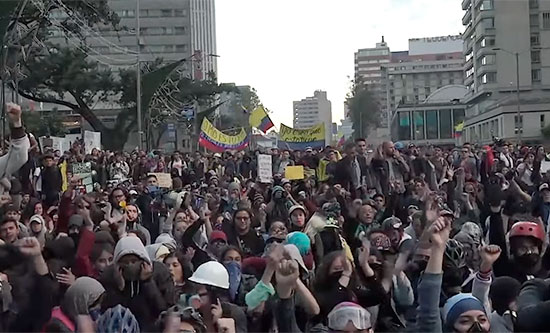
21 November saw a national day of action in Colombia, with up to one million protestors taking to the streets across the country, and protests continuing for three days. 170,000 security forces were mobilised against them. Three protesters were killed and 122 injured. Demonstrators called for an end to planned austerity measures, proper enforcement of the peace agreement with the Revolutionary Armed Forces of Colombia (FARC-EP) guerrilla group and an end to attacks on workers’ representatives. Since the 2016 Peace Accords, at least 777 social leaders and 137 former guerrilla fighters have been murdered in Colombia. In 2019, 226 social, peasant and indigenous leaders were assassinated.
622 massive marches, rallies or other forms of protest were held in 350 municipalities. 4,000 militarised riot police attacked a mass demonstration in Bogota with tear gas on 21 November. The demonstrators’ chants of ‘we are peaceful’ made no difference. A 200m-long white banner was carried, listing the names of social leaders killed in Colombia since 2016. Protesters broke the curfew and called for the end of President Ivan Duque’s government. Duque’s policies include the elimination of the state-based pension fund, raising the retirement age and hiring youth on salaries 75% of the minimum wage. In the days before the march there were 53 police raids against political organisations and publications, and social and student leaders’ homes. International land borders were closed for 24 hours and aerial surveillance used to monitor the demonstrations.
Protests have been building in previous months. On 3 September, the executive committee of the Colombian Federation of Education Workers (FECODE) – the teachers union – received death threats from the paramilitary group Águilas Negras (Black Eagles). The threats were directed specifically at named leaders of FECODE, and its branch in the region of Cauca. The threats demanded that FECODE cancel its upcoming ‘Caravan for Peace, Democracy and Life’ from Bogotá to Cauca, scheduled for 6-8 September. The threats followed a series of strikes by FECODE calling for better health coverage and conditions for educators in Colombia, the implementation of the 2016 Peace Accords and better protection for social activists who have been the victims of violence since the agreement was signed. In response to these threats to the FECODE caravan, a successful 24-hour nationwide teachers strike took place on 12 September. This success helped build the 21 November national action. Over 1,000 teachers and unionists have been killed in Colombia in the past 25 years. In 2018 at least 13 trade unionist teachers were murdered.
In the Colombian state’s continued military campaign against FARC-EP dissidents, Colombia’s Defence Minister Guillermo Botero, closely linked to far-right former President Alvaro Uribe, was accused by the Peace Commission President Roy Barreras of concealing the deaths of seven minors – from 12 to 17 years old – in a bombing carried out in the Caqueta region on 2 September. The dead were presented as ‘criminals’ and Duque proudly said that the bombing had been ‘an impeccable operation’. This case of ‘false-positives’ – widespread state killings of ordinary people presented as successful killings of FARC militants – helps Duque to justify the military campaign, and a permanent state of repression and war.
Alvaro Michaels
Fight Racism! Fight Imperialism! 273 December 2019/January 2020




